© 2022 All rights reserved Worktop Library
If you’re on the hunt for the best kitchen worktops for your kitchen, you would have come across thousands of different stone products, both natural and manufactured. But do you know what to look for before buying the correct type of worktop for your kitchen?
Importance of knowing your kitchen worktop material
Natural stone is a popular decoration material that has helped us build since immemorial times. However, most of us don’t know much about them. Knowing the difference between the different stone worktop products enables you to decide what you need for your project. Similarly, knowing the characteristics and performance of the other worktop materials makes them easier to use. This article provides you with the technical aspects of each worktop material so you can choose the best stone for your kitchen.
The Difference Between Stone Worktops
When choosing your stone worktop material, you need to know its aptitude for the project. It would help if you considered that you could not use any stone as a kitchen worktop. For example, if you know the absorption rate of a given marble, you can see whether you can use it as a worktop in the kitchen or, instead, as a vanity top in the bathroom.
Similarly, when choosing a stone for your kitchen, you may have questions such as:
- Will vinegar damage my marble worktop?
- Can bleach harm my worktop?
- Will baking soda harm my granite countertop?
- Can marble be used in a shower?
- Can marble be stained?
You can test your favourite worktop material before you buy it by ordering a Free Sample.
And more. But how do you know what is valid and what isn’t on each of the above questions?
In this article, we will condense the characteristics and performance of all the popular stone worktops so you can know what stones are suitable for different purposes. Read on.
CE Markings on the best kitchen worktops
A promising sign that your stone worktop is fit for purpose is the ‘CE Marking’. On commercial stones, the letters CE state that the company making the stone worktop material has complied with the following requirements:
- European Health & Safety
- Environmental Protection Standards
- Brands can sell it in the European Economic Area
By finding a CE Marking in your quartz worktop, you know that its manufacturer has Control Systems in place for its production and that they carry out required control tests.
Testing your kitchen worktop material
Each stone (marble, granite, quartz, etc.) has different requisites correlated to its application (worktop, tile, paving, etc.).
Testing your favourite stone is a great way to know how your favourite stone performs before you buy your kitchen worktops.
The Most Important Characteristics in a Stone Kitchen Worktop
Besides having slippage tests which are useful for applications in wet areas such as the bathroom, ice-cold resistance tests when it comes to climate, the essential features to look out for in a stone worktop are:
Water Absorption of the Best Kitchen Worktops
Porosity: is the rate at which a stone worktop absorbs liquids and is related to the density of the material. The lower the porosity, the lower liquid absorption it has. The porosity rate varies from one natural stone to another. For example, granite porosity ranges between 0.4 to 1.5 per cent. In contrast, marble is more porous than granite. As a result, marble’s porosity ranges between 0.5 and 1.98%, making it more susceptible to damage from substances that may contain acid (i.e. vinegar, etc.).
A suitable stone kitchen worktop should have a porosity scale between 0.1% and 1%. Worktop suppliers use stone sealants on natural materials such as limestone, granite, and marble. On the other hand, manufactured stones such as porcelain, quartz and ceramic come with minimal water absorption rates. It is something carefully planned by the different manufacturers during the slab-making process.
The following chart shows you the porosity rate of different stones to help you choose the best kitchen worktops with minimal liquid absorption:
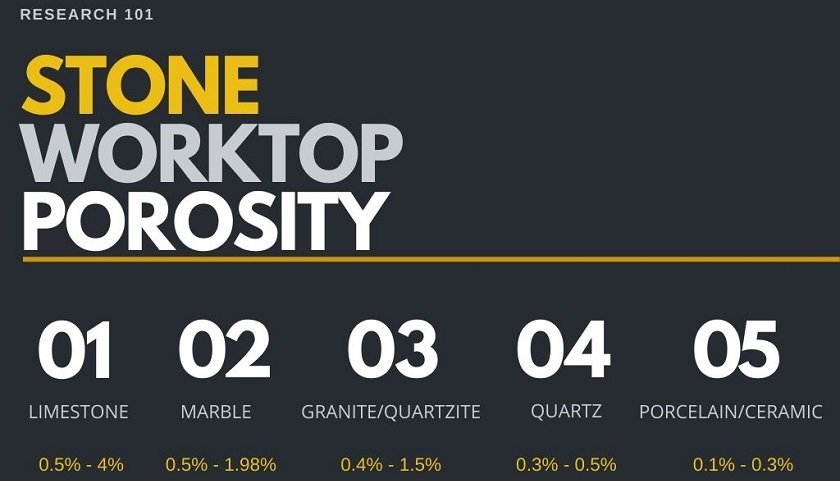
Flexural strength of the best kitchen worktops
It is the point of resistance in which a stone worktop misshapes or bends. Used in tile and façade, it is also instrumental when it comes to kitchen worktops. For example, a 12mm quartz worktop slab can bend when sitting on metal A-Frame racks for long periods, causing a bend known as ‘banana shape’. To carry out this test, manufacturers increasingly press a worktop material until it breaks.
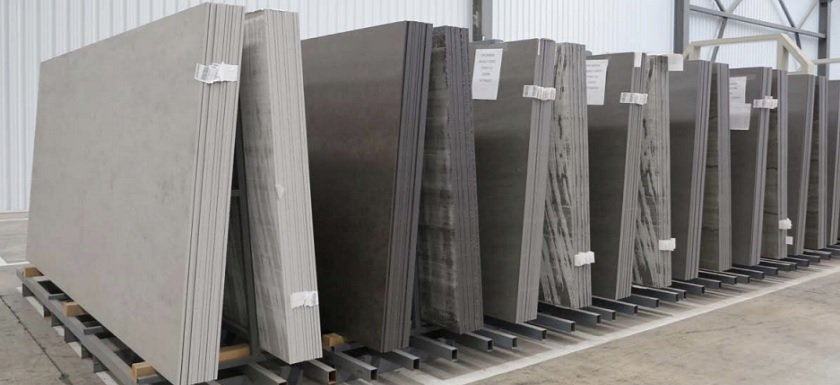
Thermal Shock Resistance
It is a crucial parameter in stones that you may intend to use in high-temperature spaces. Sudden impacts of high temperatures can cause thermal stress and damage your stone worktops. Quarries and stone manufacturers such as Silestone conduct a test, checking the highest jump in temperature that a worktop can sustain before cracking.
Are kitchen worktops heat resistant?
Yes, kitchen worktops are heat resistant. And it is I’m [ortant that you choose a worktop that can resist high temperatures when you cook. But, first, you may want to check how much temperature your worktop material of choice can withstand. Worktops’ heat resistance varies according to the different types of stone. And with specific stones like ceramic or porcelain, you can even drag your pots and pans directly from the oven onto the surfaces.
Although porcelain and ceramic are highly resistant to high temperatures, porcelain can sustain high heat for more extended periods than ceramic worktops.
Here is a chart illustrating the heat resistance of the most popular stone worktops:
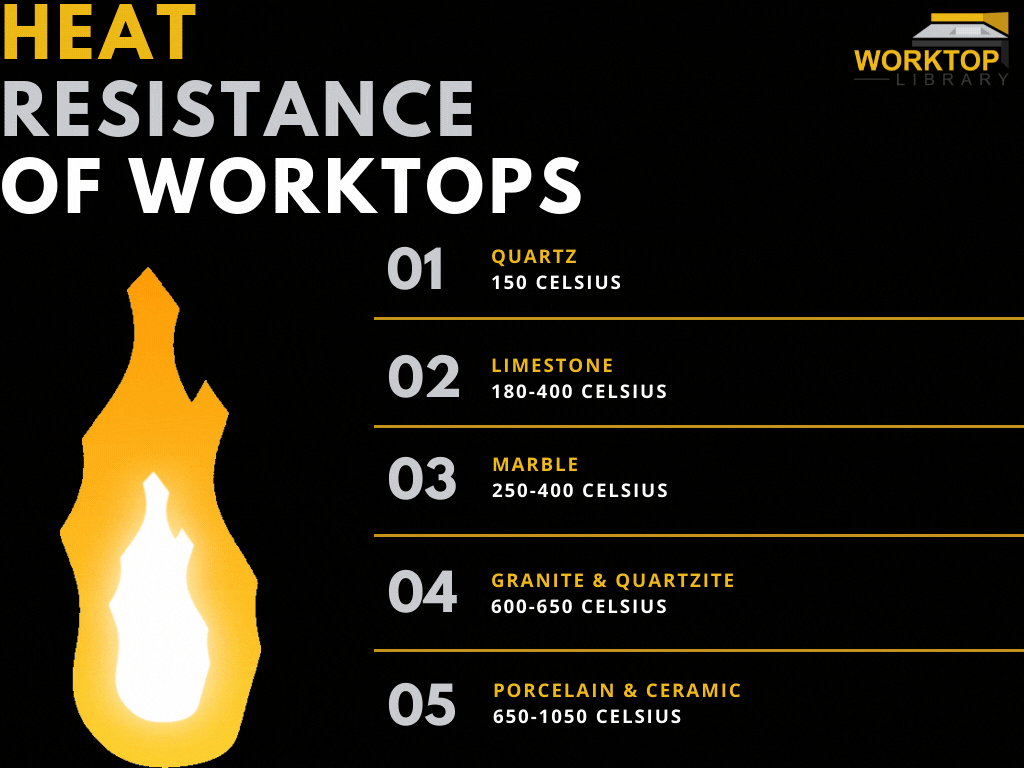
Worktop impact resistant materials
Similarly, whilst looking for a suitable worktop for your kitchen, you must check whether they are resistant to accidental impact. For example, a quartz worktop has a higher impact resistance than a porcelain countertop amongst the manufactured stones. Because ceramic countertops and porcelain are ultracompact, making them virtually zero porosity, the same characteristic lends it more rigid than quartz. More rigidity equals less flexibility, resulting in lower impact resistance rates.
We measure the resistance of stone worktops in megapascals (MPa), which is the material’s compressive strength. Then, we drop a metal ball from different heights to check how much impact we can apply to the stone before it cracks. Like the other worktop parameters, we note that the resistance to impact varies according to the different rocks.
And again, to help you choose an impact-resistant worktop, we created the following cheat-sheet containing the different countertop materials:
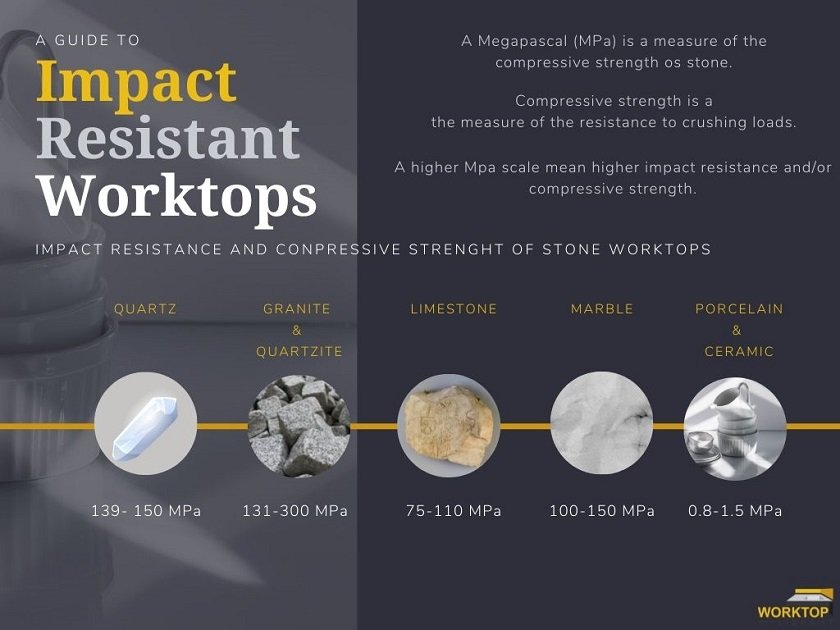
Are the best kitchen worktops antibacterial or antiviral?
To stop the propagation of COVID-19, the government recommends the disinfection of all surfaces, including your kitchen worktops. To do this, you must increase the frequency of disinfecting your countertops, as even a tiny drop originated by a sneeze or cough can infect the surfaces. Therefore, worktop suppliers and manufacturers test the materials daily.
What happens when the respiratory drop is in contact with a kitchen worktop surface?
Unless you disinfect your worktops, COVID-19 can remain alive in your kitchen surfaces for up to 72 hours. Therefore, It’s important to disinfect your countertops regularly. Moreover with a study at the University of South Wales, concluding that we touch our face an average of 23 times in one hour, now it is more important than ever before to keep your worktops clean.
How to avoid contagion of Coronavirus originated by touching the kitchen surfaces?
Alcohol-based disinfectants are the way to stop the propagation of the virus that originates in kitchen worktops by eliminating its exterior layer of proteins.
Difference between antibacterial disinfectants and virucidal disinfectants.
It is fundamental to understand that only virucidal disinfectants can attack COVID-19 and other viruses. An antibacterial disinfectant will attack the bacteria and fungus without attacking the virus itself. Therefore, use an alcohol-based disinfectant to clean your worktops, destroying the virus before it spreads and infects others.
Conclusion
Finding the best worktop material for your kitchen can be challenging due to the amount of (conflictive) information you can find online. But to simplify the process, you should look at the main features that a worktop material offers. These are its water absorption rate (i.e. porosity), Flexural strength (avoid cracking), heat resistance (prevent the scorching of the burning of the surface), Impact resistance (to prevent the chipping of its edges) and whether it has CE Markings. Follow these tips, and you’ll find the best countertop for your needs in very little time.
Author:

Alan Nussbaum
Meet Alan Nussbaum, our Sales and Marketing Manager. With almost two decades of experience, Alan’s impressive track record includes creating one of the first online stone companies in 2012 and pioneering the acceptance of cryptocurrencies in construction in 2018 before co-founding The Worktop Library with Maria.
Alan’s work is featured in numerous Stone and Home Decor magazines. In addition, he collaborates with the industry’s leading stone brands, cementing his reputation as an innovator.
Before starting a thriving career in the stone industry, Alan honed his skills by overseeing luxury fashion brands such as Burberry, Matches Fashion, and Patrick Cox. With his unique blend of experience and expertise, Alan is a true trailblazer in the stone worktop industry. His passion for delivering exceptional service is evident in every aspect of his work.

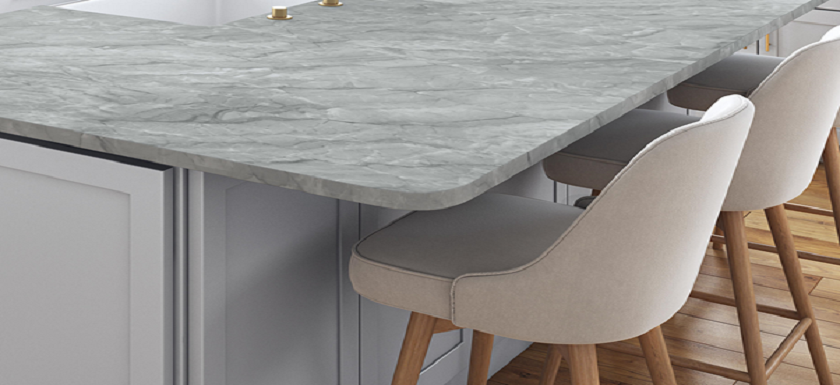 Apr 16 2021
Apr 16 2021 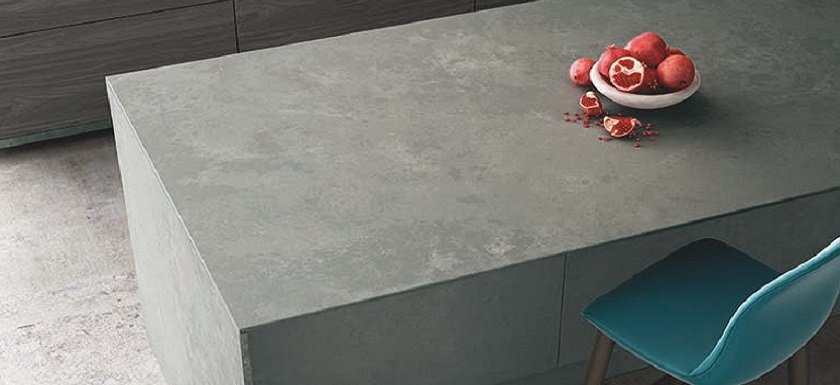 Apr 19 2021
Apr 19 2021  May 05 2021
May 05 2021 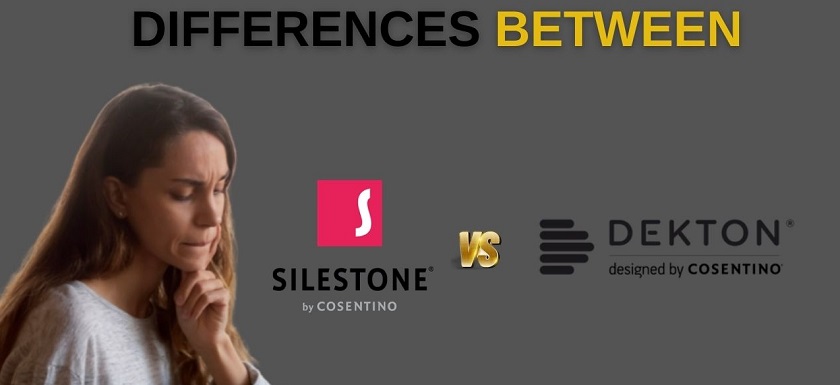 May 07 2021
May 07 2021 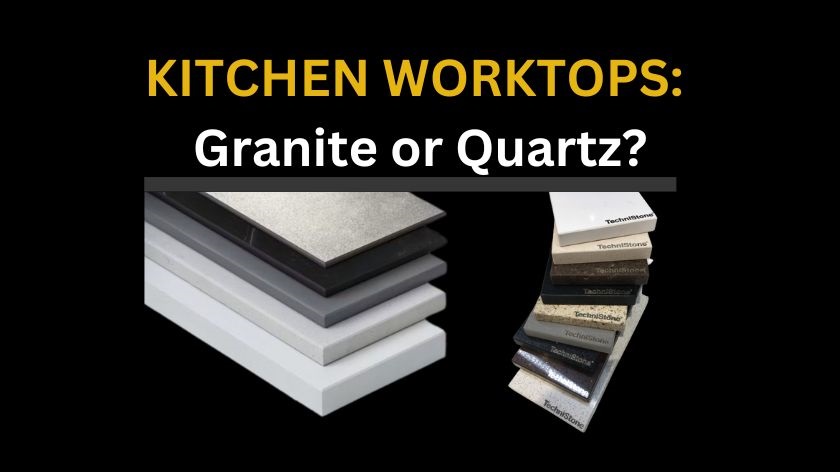 May 15 2021
May 15 2021  May 17 2021
May 17 2021 